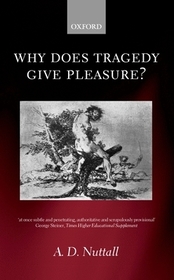
Why Does Tragedy Give Pleasure?
-
10% KEDVEZMÉNY?
- A kedvezmény csak az 'Értesítés a kedvenc témákról' hírlevelünk címzettjeinek rendeléseire érvényes.
- Kiadói listaár GBP 49.49
-
23 643 Ft (22 517 Ft + 5% áfa)
Az ár azért becsült, mert a rendelés pillanatában nem lehet pontosan tudni, hogy a beérkezéskor milyen lesz a forint árfolyama az adott termék eredeti devizájához képest. Ha a forint romlana, kissé többet, ha javulna, kissé kevesebbet kell majd fizetnie.
- Kedvezmény(ek) 10% (cc. 2 364 Ft off)
- Kedvezményes ár 21 279 Ft (20 265 Ft + 5% áfa)
Iratkozzon fel most és részesüljön kedvezőbb árainkból!
Feliratkozom
23 643 Ft

Beszerezhetőség
Megrendelésre a kiadó utánnyomja a könyvet. Rendelhető, de a szokásosnál kicsit lassabban érkezik meg.
Why don't you give exact delivery time?
A beszerzés időigényét az eddigi tapasztalatokra alapozva adjuk meg. Azért becsült, mert a terméket külföldről hozzuk be, így a kiadó kiszolgálásának pillanatnyi gyorsaságától is függ. A megadottnál gyorsabb és lassabb szállítás is elképzelhető, de mindent megteszünk, hogy Ön a lehető leghamarabb jusson hozzá a termékhez.
A termék adatai:
- Kiadó OUP Oxford
- Megjelenés dátuma 2001. március 29.
- ISBN 9780198187660
- Kötéstípus Puhakötés
- Terjedelem120 oldal
- Méret 136x216x9 mm
- Súly 168 g
- Nyelv angol 0
Kategóriák
Rövid leírás:
Why does tragedy give pleasure? Why do people who are neither wicked nor depraved enjoy watching plays about suffering and death? Is it because we see horrific matter controlled by majestic art? Or because tragedy actually reaches out to the dark side of human nature? A. D. Nuttall's wide-ranging, lively, and engaging book offers a new answer to this perennial question. Writers discussed include Aristotle, Shakespeare, Nietzsche, and Freud.
TöbbHosszú leírás:
Why does tragedy give pleasure? Why do people who are neither wicked nor depraved enjoy watching plays about suffering or death? Is it because we see horrific matter controlled by majestic art? Or because tragedy actually reaches out to the dark side of human nature? A. D. Nuttall's wide-ranging, lively and engaging book offers a new answer to this perennial question.
The 'classical' answer to the question is rooted in Aristotle and rests on the unreality of the tragic presentation: no one really dies; we are free to enjoy watching potentially horrible events controlled and disposed in majestic sequence by art. In the nineteenth century, Nietzsche dared to suggest that Greek tragedy is involved with darkness and unreason and Freud asserted that we are all, at the unconscious level, quite wicked enough to rejoice in death. But the problem persists: how can the conscious mind assent to such enjoyment? Strenuous bodily exercise is pleasurable. Could we, when we respond to a tragedy, be exercising our emotions, preparing for real grief and fear? King Lear actually destroys an expected majestic sequence. Might the pleasure of tragedy have more to do with possible truth than with 'splendid evasion'?
shrewd and learned book.
Tartalomjegyzék:
Aristotle and After
Enter Freud
The Game of Death
King Lear
Index




